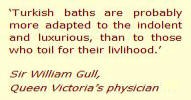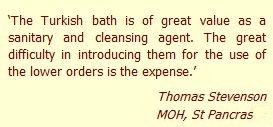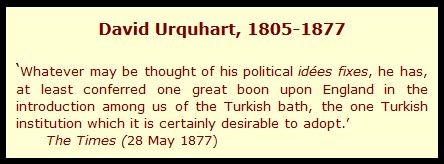Clean in body and mind:
David Urquhart’s Foreign Affairs Committees
and the Victorian Turkish Bath Movement
This is a single frame, printer-friendly page taken from Malcolm Shifrin's website
Victorian Turkish Baths: their origin, development, and gradual decline
Visit the original page to see it in its context and with any included images or notes
5: The committeemen: clean in body and mind
Most of the few historians who have discussed the Foreign Affairs Committees are agreed that their political work had little effect on the events they sought to influence. But no one has been able to explain the loyalty, to Urquhart and his ideals, of so many committeemen, selflessly working for political beliefs which would never affect them personally.
Undoubtedly, Urquhart first saw his working men as a means of putting pressure on members of the government. But he soon became aware of them as people: that they responded to those that took an interest in them. He believed that everyone had a right to participate, not in something as pointless (in his view) as voting, but in actively arguing for what they believed in, whatever the result.
He gave them a sense of purpose and of pride in themselves, inspiring them with a vision of what they could achieve, and then gave them the skills to enable them to start taking advantage of their inherent ability.
He ran workshops on subjects apparently divorced from the needs of everyday life; in fact he gave them skills which they, almost unknowingly, did use in everyday life.
He found that his working men were also practical people with manual and technical abilities, that they were interested in the progress of the bath-building, and that one after the other showed an interest in building and using them, in offering their use to their colleagues, and considering in groups how best to share the fuel costs. Finally, he encouraged them to run Turkish baths as a means of financial support.
And after the few active years of the committees, the men had skills of lasting value which few would probably otherwise have had.
The committees also saw the value of using their bath premises as a meeting-place, providing an alcohol-free environment where the men, and on separate occasions their wives, could meet in the equivalent of the leisured gentleman’s club.
The Urquhart Bequest at Balliol College includes many letters asking his advice on locations, temperatures, costs and many other aspects of providing Turkish baths. Some committees asked Urquhart to visit them to help them decide whether to go ahead with building one.
Each committee reported to the others what he said, and which bath they relaxed in afterwards.
Assessing the impact of the committees' baths
Focusing on Urquhart and his workingmen’s Turkish Bath Movement is not, of course, to argue that it was more important or effective than clean water supplies, sewers, slipper baths, wash-houses, or even swimming pools.
But the national provision of Turkish baths as part of publicly funded swimming facilities should have built on the committees’ success. As it was, those who most needed personal cleansing facilities were, for too long, denied them. And the refusal of local authorities to provide them, reinforced the suggestion that Turkish baths were a luxury suitable only for the upper classes.
There were plenty who held such views.


Although the Turkish Bath Movement was initiated by Urquhart, the movement was not what Sheard would call a ‘working-class response to middle-class sanitarianism’.
Rather, in the words of working-class John Johnson, writing to an overseas enquirer,
… I beg to remark that the men who took up the Bath and established it in England were men possessed of no medical knowledge or skill. They were working men who got a knowledge of the benefits and delights of the Bath from Mr Urquhart, and acting on this, immediately set about turning it to advantage...
To those involved in the committees, there was no questioning the validity of a confluence of the supporters of a political view, and the supporters of the Turkish bath.
In May 1857, Urquhart, replying to Benjamin Bishop who had written for advice on building a bath, wrote:
It has long been an idea of mine, to associate with each committee a proprietary Bath; for the cleaning of the mind and body go hand in hand.
Seven years earlier, he had written in The Pillars of Hercules,
What filth is to the body, error is to the mind; and therefore if we are to use our reason in regard to the former, we must have a standard of cleanliness as well as of truth.
This single pair of complementary ideas can be said to sum up Urquhart’s attitude to life—the concept of cleanliness in body and mind.
This page revised and reformatted 02 January 2023
The original page includes one or more
enlargeable thumbnail images.
Any enlarged images, listed and linked below, can also be printed.
David Urquhart: a sketch

Victorian Turkish Baths: their origin, development, and gradual decline



Comments and queries are most welcome and can be sent to:
malcolm@victorianturkishbath.org
The right of Malcolm Shifrin to be identified as the author of this work
has been asserted by him
in accordance with the Copyright, Designs and Patents Act 1988
© Malcolm Shifrin, 1991-2023
